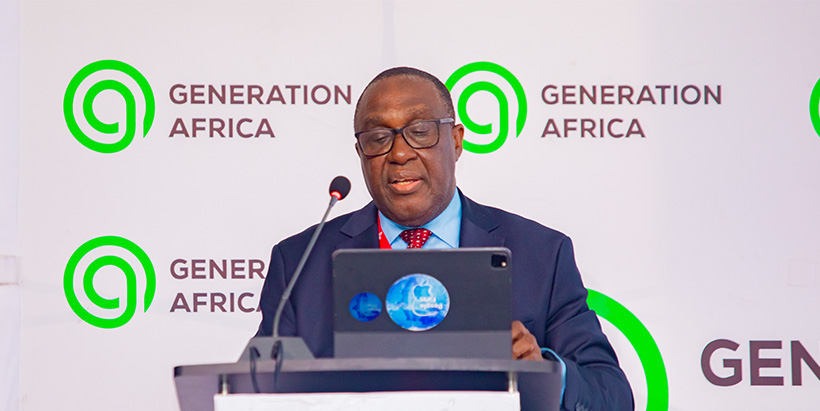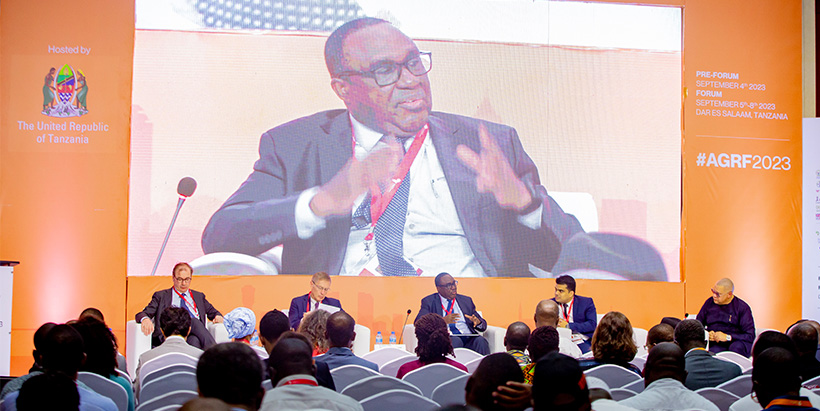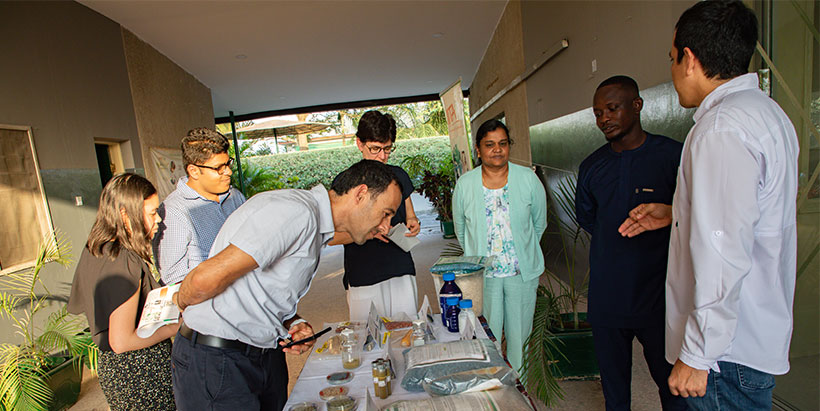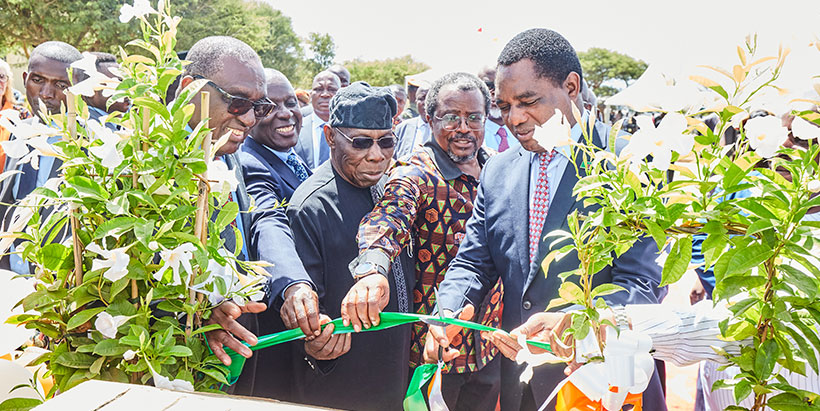Strengthening partnerships for food systems in Africa
IITA–CGIAR played a key role at the just concluded Africa Food Systems Forum (AFSF) hosted in Tanzania towards aligning agricultural research and innovation with food systems in Africa. IITA Director General and CGIAR Regional Director for Continental Africa, Dr Simeon Ehui, represented the CGIAR at strategic meetings during the summit.

IITA Director General and CGIAR Regional Director for Continental Africa, Dr Simeon Ehui during his speech.
In a meeting with the Government of Tanzania, Dr Ehui, accompanied by former Nigerian President and IITA Goodwill Ambassador Chief Olusegun Obasanjo, discussed ways to strengthen collaboration between the Institute and the Tanzanian government with the President of Tanzania Samia Suluhu Hassan. The meeting focused on crucial initiatives, such as advancements in bioscience research and support for the government’s Building Better Tomorrow program.
President Hassan reaffirmed her commitment to agricultural transformation, agreeing to become IITA’s Eastern Africa Champion for agricultural research.
Exploring ways to continue supporting research capacity building and infrastructure enhancement in Tanzania, Minister of Agriculture Honorable Hussein Bashe appreciated IITA’s contributions to the nation’s agriculture sector. Speaking with Hon. Bashe, Dr Ehui reiterated IITA-CGIAR’s unwavering commitment to supporting Tanzania’s agricultural transformation journey.
A pre-summit field trip was organized to showcase IITA’s cutting-edge research and innovation, contributing to seed delivery models, value chains, digital solutions, agri-nutrition, and youth engagement.
Participants at the pre-summit event emphasized the importance of such gatherings promoting agricultural innovations in Tanzania and across Africa.
During the “Unearthing Resilient Markets for Cassava Farmers in Tanzania” event, participants discussed the sustainable cassava seed systems and the significant role played by cassava seed entrepreneurs in Tanzania. Key stakeholders from the private sector, policymakers, farmers and processors, government institutions, NGOs, development partners, and CGIAR participated in the meeting.
Highlighting the market potential of certified disease-resistant cassava seed varieties and the impact on the economy of farmers and agribusinesses, stakeholders explored viable ways to strengthen the cassava seed systems.
Speaking at the event, the Director of Crop Development, Tanzania Ministry of Agriculture, Dr Nyasebwa Chimagu, emphasized the importance of block farming, digital platforms, and mechanization in enhancing efficiency.

IITA Director General and CGIAR Regional Director for Continental Africa, Dr Simeon Ehui during a plenary session.
In a keynote on transforming African food systems to cope with climate change, Dr Ehui reiterated the need to drive the climate-smart agriculture conversation with collaborations. He said research and innovation delivery is strategic to CGIAR’s agenda to transform African and global food systems.
The “Advancing Prosperity in Africa through Efficient Farming and Seed Systems” event, co-organized by the IITA-led project Technologies for African Agricultural Transformation (TAAT), funded by the African Development Bank (AfDB) and the Bill & Melinda Gates Foundation, along with the CGIAR Excellence in Agronomy (EiA) initiative, featured opening remarks by former President of Tanzania and Founder of the Jakaya Mrisho Kikwete Foundation (JMKF) Dr Jakaya Kikwete.
With keynote addresses from Dr Martin Fregene, Director of Agriculture and Agroindustry at AfDB, and Dr Namukolo Covic, ILRI Director General’s representative to Ethiopia and CGIAR Country Convenor, CGIAR’s Regional Director, East and Southern Africa (ESA).
IITA hosted the USDA Undersecretary Jenny Moffit during the AFSF. The visit provided an opportunity for the team to showcase projects supported by USDA and USAID in East Africa and research on cassava viruses, soil testing, Aflasafe, Banana Bunchy Top Virus (BBTV), and food processing.
In another crucial meeting hosted by IITA, Univeristé Mohammed 6 Polytechnique (UM6P) and CGIAR focused on a partnership that will foster robust collaborations between CGIAR Centers in Africa and UM6P, a top-tier university in Morocco, specifically in research, technology delivery, scaling, and capacity development within agriculture and food systems.
While the AFSF provided the platform for impactful meetings with the potential to drive the transformation of Africa’s food systems forward positively, it was also an opportunity for IITA and other CGIAR centers to realign their agenda, strengthen partnerships and initiatives, and refocus collective strategies towards ensuring delivery of regional and global goals.
Contributor(s)
Next read


